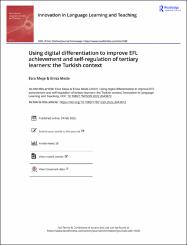Using Digital Differentiation to Improve EFL Achievement and Selfregulation of Tertiary Learners: The Turkish Context
Citation
MEŞE, Esra & Enisa MEDE. "Using Digital Differentiation to Improve EFL Achievement and Selfregulation of Tertiary Learners: The Turkish Context", Innovation in Language Learning and Teaching, (2022): 2-14.Abstract
Purpose: The current study examines the impact of Differentiated
Instruction (DI) on students’ EFL speaking proficiency and Self-
Regulated Learning (SRL) during online learning at a Turkish higher
education institution’s English preparatory program.
Design/methodology/approach: Carried out as a sequential explanatory
mixed-methods approach, this quasi-experimental study first collected
quantitative data from two intact classrooms, experimental group (n =
16), control group (n = 15), through a speaking proficiency test and the
Turkish translation of a Likert-type Online Self-Regulation Questionnaire
(OSRLQ) as pre-/post-test; and qualitative data through a semistructured
focus group interview with six students. The qualitative data
were coded and interpreted through content analysis.
Findings: Based on Tomlinson’s (2001) DI framework, the intervention
plan of this study involved differentiating the process, product and
learning environment of the online learners based on their readiness
levels and interests. The results revealed that the DI-group improved its
speaking significantly higher than the non-DI group whereas the overall
SRL of the both groups did not differ meaningfully. The DI-group
improved its help-seeking strategy use significantly. The analysis of
qualitative data indicated that the students held positive views of
online practices used for DI purposes such as formative assessment,
differentiated speaking tasks while questioning group work
arrangements. The participants also stated that they improved their use
of target setting, help seeking and self-assessment.
Originality/value: This study contributes to the literature in providing
insight into the effects of differentiation practices during online
learning and suggests implications for designing innovative
differentiated EFL learning experiences during remote learning.



















